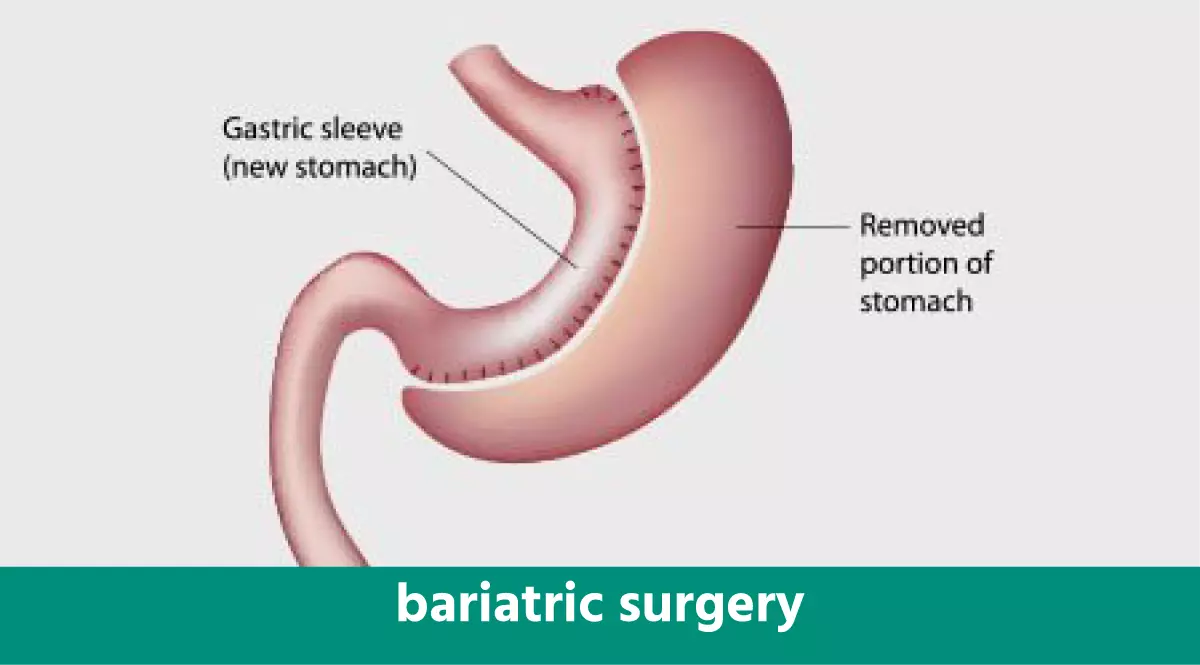Weight Loss Surgery or bariatric surgery is considered when someone is very overweight. It can lead to various health issues, like diabetes, high blood pressure and so on.
Over the years, bariatric surgery has become safer, less invasive, and increasingly popular. As per the American Society for Metabolic and Bariatric Surgery (ASMBS), over 250,000 of these surgeries are conducted in the United States every year. If you’re also a very overweight person, you can take part in weight loss surgery treatment.
For this, first of all, you have to meet all the requirements and should find the best healthcare provider in your favour. Here we have talked about all the necessary information to get weight loss surgery near you.
What Is Weight Loss Surgery
Bariatric surgery, also called weight loss surgery, helps people lose weight by altering how their digestive system functions. These surgeries can make the stomach smaller, alter digestion, or do both together. These surgeries are usually advised for severely obese people who haven’t succeeded with regular weight loss methods like dieting or exercise.
These surgery procedures, such as gastric bypass, gastric sleeve, and gastric banding, all aim to assist in weight loss but through different methods.
Types of weight loss surgery
There are various kinds of bariatric surgery surgery. Some familiar options are:
1. Gastric Bypass
Gastric Bypass surgery creates a small pouch from the stomach, connecting it directly to the small intestine, bypassing a section of the stomach and intestine. This rerouting alters digestion, aiding weight loss by limiting food intake and absorption.
2. Gastric Sleeve
In a gastric sleeve procedure, a significant portion of the stomach is surgically removed, leaving behind a smaller, sleeve-shaped stomach. This alteration helps in reducing the amount of food the stomach can hold, aiding weight loss.
3. Gastric Banding
Gastric banding is a procedure where a flexible band is surgically placed around the upper stomach to create a smaller pouch. This adjustable band helps control food intake by limiting the amount of food the stomach can hold, aiding in weight loss.
4. Duodenal Switch
The Duodenal Switch procedure combines elements of gastric sleeve and bypass. It entails removing a portion of the stomach and rearranging the small intestine, aiming to limit food intake and reduce the absorption of calories and nutrients for weight loss.
5. Biliopancreatic Diversion with Duodenal Switch (BPD/DS)
This type of surgery combines sleeve gastrectomy with a more extensive intestinal bypass, altering the digestive tract to reduce food absorption. It involves a longer bypassed section of the intestine compared to other procedures for weight loss.
Each kind of surgery assists in weight loss by controlling food intake, absorbing fewer nutrients, or both. Deciding on the surgery considers aspects such as health condition and weight loss objectives.
Risks of Weight Loss Surgery
Like any other surgery, bariatric surgery comes with possible risks that people should know about. These risks include various possibilities such as infections, bleeding, blood clotting, or reactions to anaesthesia, which might happen during or after the procedure.
Additionally, depending on the specific weight loss procedure, there could be issues such as leaks in the digestive system, the formation of gallstones, or possible nutritional gaps due to changes in how your body absorbs nutrients.
Besides these, bariatric surgery could alter bowel habits or require further surgeries later on. It’s crucial to have thorough talks with your healthcare team to completely understand these risks before deciding on the surgery. Keeping up with appointments and following the guidance after surgery is key to handling risks, ensuring a smoother recovery, and better health.
How to Get Weight Loss Surgery Near Me
The process of getting bariatric surgery usually includes these stages:
1. Consultation With Healthcare Providers
Start by consulting a healthcare provider to discuss if surgery is suitable for you based on your unique health condition, weight loss objectives, medical history, and the potential benefits and risks associated with various procedures.
2. Assessing Physical and Mental Health for Surgical Candidacy
During the evaluation, your physical and mental health undergo thorough assessments, like medical tests and exams, occasionally involving psychological evaluations. The goal is to confirm if you meet the criteria for weight loss surgery, ensuring you’re prepared both physically and mentally for the procedure.
3. Understanding Financial Aspects
In this stage, you’ll thoroughly examine your insurance plan to confirm if it covers bariatric surgery. Explore the approval conditions, required documents, and any prerequisites set by your insurance company to ensure coverage for the surgery.
4. Preparation for the Surgical Journey
Before the surgery, diligently adhere to the pre-surgery instructions outlined by your healthcare team. This stage might encompass dietary modifications, lifestyle changes, medical tests, and discontinuation of certain medications or habits to optimise your health status for the impending surgery.
5. Surgery
Upon meeting the necessary criteria and receiving approval, the surgical procedure is performed by expert bariatric surgeons. This step involves the actual operation based on the chosen surgical approach, conducted in a hospital or specialised surgical centre under controlled and monitored conditions.
6. Post-Surgery Care
After the surgery, make sure to follow the instructions given by your medical team. Stick to a particular diet, exercise routine, and attend your scheduled check-ups. This helps in a smooth recovery, keeps track of your progress, handles any possible issues, and supports the best weight loss results.
Remember, the process might differ based on individual health situations and healthcare systems. Always consult healthcare professionals for personalised guidance.
Behaviours and Mental Health Before Weight Loss Surgery
After surgery, how much weight you lose depends on how you adjust your eating and exercise habits. It’s essential to be mentally healthy to handle the demands of your treatment plan. Your team aims to spot any psychological or behavioural issues, tackle problems, and determine if you’re prepared for surgery.
Your healthcare team will discuss the following with you:
(1) Motivation
Are you eager to adopt new habits, set targets, and learn about eating well? Your team will monitor how well you’re adapting to the suggested changes in your diet and exercise plan.
(2) Weight Management History
Have you experimented with diets or exercise plans to lose weight before? Did they work, or did you regain weight? Understanding your weight loss journey helps us understand your challenges and create effective strategies after surgery.
(3) Eating Routines
Different eating habits or disorders can play a part in causing obesity. These might involve overeating at once, eating late at night, or snacking unexpectedly between meals. Some eating habits can be connected to mood disorders and various mental health challenges.
(4) Emotional Disturbances
Conditions like depression, anxiety, or bipolar disorder can be linked to obesity, making it tough to manage weight. Those with untreated mood issues might struggle to stick to new diet and exercise routines post-surgery.
(5) Alcohol and Drug Use
Challenges with alcohol, drugs, or smoking can interfere with weight loss post-surgery and worsen substance-related problems. Untreated issues may make weight-loss surgery less suitable.
(6) Suicide Risk
Following weight-loss surgery, individuals facing depression, anxiety, bipolar disorder, substance use problems, schizophrenia, or similar conditions have a higher risk of suicide.
Expectations Before Undergoing Surgery
If the team suggests bariatric surgery, they’ll collaborate with you to create a plan of action. This may include:
- Nutrition guidelines: The nutritionist will assist you in understanding dietary advice, choosing the right vitamin supplements, and planning your meals. These guidelines cover adjustments both before and after the surgery.
- Exercise plan: A nurse, occupational therapist, or another specialist will assist you in understanding suitable exercises, crafting an exercise regimen, and establishing objectives.
- Weight loss: Before your surgery, you might receive advice or be asked to shed some weight by following a diet and exercise routine.
- Psychotherapy: You might need therapy like talk therapy or medication to address conditions like eating disorders or depression. This could involve learning new coping skills or focusing on body image and self-esteem issues.
- Smoking: If you smoke, you’ll be encouraged to stop smoking or join a program designed to support you in quitting.
- Other treatments: You’ll need to follow treatments for other health issues or conditions.
These guidelines are here to help you achieve the best weight-loss results after surgery. Your commitment to following them shows how dedicated you are to following post-surgery instructions.
BMI for Weight Loss Surgery
Your BMI (Body Mass Index) is vital in determining if you qualify for weight loss surgery. Typically, those with a BMI above 40 or between 35-40 with obesity-related health issues may be eligible.
Therefore, the requirements may differ depending on the particular surgery and healthcare provider. BMI serves as a primary guideline to assess the level of obesity and evaluate whether surgery could be an effective option for weight management.
Life After Weight Loss Surgery
Life after bariatric surgery often engages significant changes. These changes encompass adjusting to a fresh diet, adhering to a rigorous eating regimen, and staying committed to regular exercise. Patients must follow the guidelines provided by their healthcare team to ensure successful weight loss and prevent complications.
Moreover, consistent medical appointments and guidance from nutritionists or therapists might be needed to track progress and assist in adapting to the physical and emotional shifts following the transformation. Overall, it’s a journey that requires commitment and dedication to embrace a healthier lifestyle for long-term success.
Pros and Cons of Weight Loss Surgery
Bariatric surgery has its good and bad sides, like any medical procedure. Here’s the pros and cons of this surgery:
Pros:
- Enhanced Quality of Life: Many people report improvements in their overall quality of life, mobility, and mental well-being following successful weight loss.
- Effective Weight Loss: Surgery can result in significant weight loss, especially for individuals with severe obesity who have struggled to lose weight through other means.
- Improvement in Health Conditions: Weight loss surgery often leads to improvements or even resolution of obesity-related health issues like type 2 diabetes, high blood pressure, sleep apnea, and joint pain.
Cons:
- Risks of Surgery: All surgeries carry risks, including infection, blood clots, adverse reactions to anaesthesia, and in rare cases, even death.
- Lifestyle Changes: Successful outcomes require significant lifestyle adjustments, including dietary changes, increased physical activity, and lifelong adherence to specific guidelines.
- Potential Complications: Some individuals may experience complications post-surgery, such as nutrient deficiencies, gallstones, vomiting, or complications related to the surgical procedure itself.
- Psychological Impact: It’s essential to address the psychological impact of such a transformative procedure, as some individuals may experience emotional challenges or adjustments after surgery.
Ultimately, the decision to undergo weight loss surgery should involve careful consideration, discussion with healthcare experts, and understanding its possible benefits and risks.
How Much is Weight Loss Surgery Cost?
The cost of bariatric surgery varies based on location, health needs, and insurance coverage, ranging from $7,500 to over $30,000 pre-insurance, but it varies for each person. If you’re curious about the cost near you, it’s best to talk to your healthcare provider during a consultation.
What is the Best Weight Loss Surgery for Me
Different weight loss surgeries vary in how well they work. Gastric bypass typically leads to about 70% reduction in excess body weight, while a duodenal switch can result in an 80% decrease. On the other hand, sleeve gastrectomy ranges from 30% to 80% weight loss.
Among these surgeries, gastric sleeve stands out as safer with lower risks of complications and higher effectiveness in weight loss. For those battling obesity, weight loss surgery offers an impactful method to reduce and manage weight successfully.
Government-funded Weight Loss Surgery
Government-funded weight loss surgeries are often accessible through public health programs or healthcare systems across different nations. Usually, you need to meet specific rules based on your BMI, health problems from obesity, and past attempts to lose weight without surgery. The availability, coverage, and specific requirements for government-funded weight loss surgeries vary significantly across different healthcare systems and countries.
In some regions, patients need to meet strict rules or have an assessment before getting government-funded weight loss surgery. These surgeries are meant to help people with severe obesity who haven’t had success with other methods or face health dangers from their weight.
Why Weight-loss Surgery Can Be Delayed or Cancelled
Before weight-loss surgery, various factors can lead to delays or cancellations. If there are sudden health issues, making sure you’re safe might mean delaying the procedure. Failing to meet the requirements before surgery, such as fasting or medical assessments, might also lead to delays. Problems regarding insurance approval or coverage could cause delays in the scheduling.
Also More: Catastrophic Injury Lawyer
Moreover, if you’re not entirely ready physically or emotionally, the medical team might postpone the surgery to ensure a more favourable result. Occasionally, clashes in scheduling or the unavailability of the surgical team or facility might also require rearranging the surgery date. These different reasons explain why weight-loss surgeries could be postponed or called off, ensuring both your safety and the procedure’s success.
Bottom Line
Weight loss surgeries are generally safe. However, all surgeries carry bleeding and infection risks, as well as risks associated with general anaesthesia. It may be a costly treatment for someone. But it may help a very overweight person to live a healthy and happy life.
 Somoy Media All Time Information
Somoy Media All Time Information



